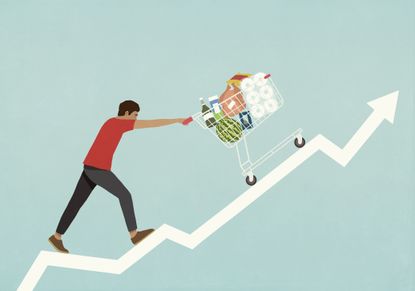UK inflation eases to 10.7% ‒ what does it mean for your money?
Inflation has fallen at the sharpest rate in 16 months to 10.7%. But prices are still rising - we explain everything you need to know.


The UK inflation rate stood at 10.7% in November, down from 11.1% in October, new figures from the Office for National Statistics (ONS) show.
It means prices are still rising, but at a slower rate than the 11.1% in October when they were rising at their fastest rate since October 1981.
A drop in the price of petrol and diesel was cited as part of the reason for the fall, according to the ONS. Overall, fuel prices rose by 17.2% in the year to November 2022, down from 22.2% in the year to October.
Labour's Shadow Attorney General, Emily Thornberry, says though this month's inflation figures are to be "welcomed", they are still "the second worse for 40 years".
Food prices remain high, rising 16.5% in November compared to 16.4% the month before, with grocery bills having risen for 16 months in a row.
Prices at restaurants and hotels also rose by 10.2% in November, the highest rate in more than 20 years, up from 9.6% the month before.
The rising rates reflect the current cost of living crisis, with millions of households struggling with rising energy bills, food costs and petrol prices.
Look After My Bills Newsletter
Get the best money-saving tips, tricks and deals sent straight to your inbox every week. Make sense of your money in partnership with The Money Edit.
We look at what the change in inflation means for the money in your pocket.
What does it mean for my money?
In simple terms, it means a basket of everyday goods costing £100 in October 2021 now costs £110.70.
Easing inflation shows that the cost of goods and services are still rising but at a slower rate. This easing is a bit of good news for households, with some experts believing inflation has now peaked.
The ONS inflation calculator allows you to see your own personal rate of inflation, whether you’re a single-person household or a family of five. It will show you where your budget is being hit the hardest and help you assess where to cut back. For example, if your food costs have gone up significantly (which will definitely be the case) you could change supermarkets or start food planning.
High inflation is a disaster for your savings. It means in order to grow your savings in real terms, you need to find savings accounts that pay rates above the rate of inflation. These simply don’t exist right now. The best savings account on the market is First Direct Regular Saver that pays 7% on savings up to £3,600. (Note you need its current account)
See our article on the best savings rates for more.
Katie is staff writer at The Money Edit. She was the former staff writer at The Times and The Sunday Times. Her experience includes writing about personal finance, culture, travel and interviews celebrities. Her investigative work on financial abuse resulted in a number of mortgage prisoners being set free - and a nomination for the Best Personal Finance Story of the Year in the Headlinemoney awards 2021.
-
 Three energy firms pay £8m in switching compensation - has your provider paid out?
Three energy firms pay £8m in switching compensation - has your provider paid out?More than 100,000 customers have received compensation after changing providers, but is now a good time to switch energy suppliers?
By Tom Higgins Published
-
 Save £300 on your supermarket shop with cashback accounts
Save £300 on your supermarket shop with cashback accountsBanks, credit card companies and cashback sites are all offering cashback on your supermarket shop, but can you use them all to max out your savings?
By Vaishali Varu Published
-
 Save on petrol: how to save 5p off a litre of fuel at Morrisons
Save on petrol: how to save 5p off a litre of fuel at MorrisonsPetrol prices may have been falling since last summer but every penny counts at the pump. Here’s how to save 5p a litre at Morrisons for a limited time
By Sue Hayward Published
-
 Morrisons relaunches discount scheme with cheaper prices for loyal shoppers
Morrisons relaunches discount scheme with cheaper prices for loyal shoppersMorrisons is the latest supermarket to revamp prices and offers for its loyalty scheme members
By John Fitzsimons Published
-
 Coronation freebies and discounts: what’s up for grabs
Coronation freebies and discounts: what’s up for grabsFrom free railcards and holiday giveaways to discounts off food, we highlight the special offers launched to mark the coronation of King Charles III
By Ruth Emery Last updated
-
 8 ways to get interest-free money if you’re struggling
8 ways to get interest-free money if you’re strugglingHere are 8 clever ways to get interest-free income if you’re struggling with the rising cost of living
By Vaishali Varu Last updated
-
 Best birthday freebies and discounts
Best birthday freebies and discountsEnjoy your special day with these birthday discounts and freebies - we highlight 22 of the best offers
By Vaishali Varu Published
-
 Festival ticket scam warnings – how to protect yourself
Festival ticket scam warnings – how to protect yourselfConcert ticket scams have rocketed by more than 500% over the past year, while festival fraud has more than doubled. Here’s how to keep yourself safe ahead of the festival season.
By Tom Higgins Published
-
 Co-op Member Prices: Supermarket unveils discount scheme for loyal shoppers
Co-op Member Prices: Supermarket unveils discount scheme for loyal shoppersNew Co-op scheme means reduced prices for shoppers who join the co-operative. How much does it cost to join, and how does it compare to similar schemes run by Sainsbury’s and Tesco?
By John Fitzsimons Published
-
 Emergency alert test: what to expect and how to avoid being scammed
Emergency alert test: what to expect and how to avoid being scammedWe tell you everything you need to know about the UK’s first emergency alert test, which takes place this Sunday
By Vaishali Varu Published